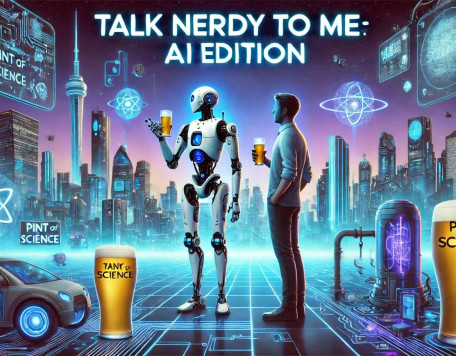© Pint of Science, 2025. All rights reserved.
Join engineers from the University of Liverpool to discover whether we’ll all one day be driving flying cars, how nature can be used to tackle climate change and how we help make sure nuclear technology is safe.
This eclectic mix of talks showcases the breath and scope of the work happening in the School of Engineering, highlighting creativity and innovation.
How do logjams slow the flow?
Dr Elizabeth Follett
(Royal Academy of Engineering Research Fellow)
Logjams create an upstream backwater of slower, deepened water, promoting sediment deposition and flow heterogeneity. Engineered logjams are installed as nature-based solutions, aiming to improve resilience to drought and flooding due to climate change. Using flume experiments, we demonstrate that the accumulation of wood pieces acts as a porous obstruction, with momentum loss proportional to the number, size, and packing density of the logs. This result enables physically based representation of logjams in hydraulic flood models, improving design and assessment of nature-based solutions.
Where’s my flying car?
Prof Mike Jump
(Professor of Aerospace Systems)
Many visions of the future include the concept of a flying car – a vehicle that you can park outside your home, drive like a car, but then conveniently avoid the inevitable rush-hour traffic-jams by taking off and flying over them. Recent advancements in electric propulsion and flight control have brought such vehicles perhaps a step closer. This talk will showcase the current, so-called, ‘advanced air mobility’ landscape and discuss the problems still to be solved before science fiction can become science fact.
Materials in Radiation Extremes
Dr Maulik Patel
(Reader in Nuclear Materials Science)
Materials used in nuclear technologies experience constant radiation environment leading to loss structural integrity due to displacement of atoms. Studying how material properties change over 10-10,000 years in such environments is essential for safe and efficient use of nuclear technology. Thus, materials hold the key to a zero-carbon and eventually a negative-carbon civilization. The talk will showcase how radiation affects materials, advance techniques employed to study these processes and the cocktail mix required to develop radiation-tolerant materials for nuclear technologies.
Map data © OpenStreetMap contributors.
Other Frederiks events
2025-05-19
Black Holes, Solar Sparks and Fueling the Future
Frederiks
32 Hope Street, Liverpool, L1 9BX, United Kingdom
2025-05-21
Talk Nerdy to Me (AI Edition)
Frederiks
32 Hope Street, Liverpool, L1 9BX, United Kingdom




